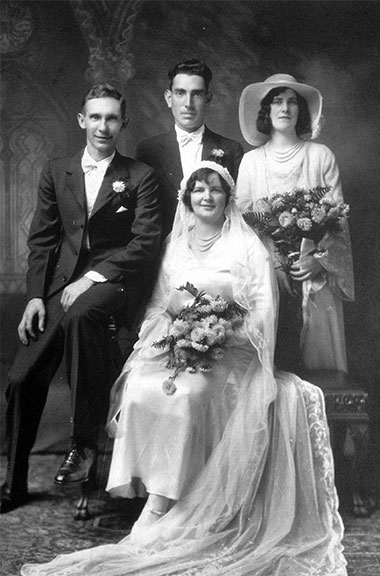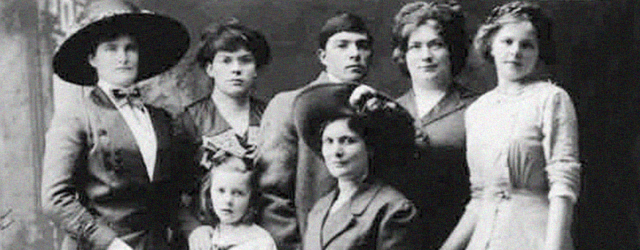By Pete Sigmund
Ever hear of “the living out girls?”
They were, like the well-known characters in the Downton Abbey TV series, the servants who kept great estates going as maids, tutors, cooks, companions and other essential help.
Living out girls, however, were something more. They were Irish. If you are over 80, you may have known of them way back when. One such person with a long memory is Sister Frances Patrice Kirk, SSJ, 83, a member of the Sisters of St. Joseph order at St. Joseph’s Villa in Flourtown. (Sister Frances was the first nun to be grand marshal of the Philadelphia St. Patrick’s Day parade, in 1990.)

Falls-Kirk Wedding—_Elizabeth Rose Falls and her husband Francis Joseph Kirk (left) are with George McDonough and Margaret Falls.
“My mother, Elizabeth ‘Lizzie,’ was one of 13 children. She came to Philadelphia from County Tyrone in 1923 to be a companion for the elderly, ailing mother of Mr. Harrison, a sugar magnate who lived in one of the large estates in the Torresdale area of the Far Northeast,”
Sister Frances says. “The Harrisons and other wealthy families like the Biddles, Drexels, and Egans, greatly needed the warm and dedicated service of girls like my mother, who were ‘living out’ in the great houses. There were well over 100 Irish living out girls working for the owners of the Torresdale estates, whom they called ‘the big bugs.’
“They often had a half-day off on Sunday afternoons. On one of these days in 1929, my mother, her sisters Maggie and Mary, walked to a car dealership in Torresdale. A young salesman there told them, ‘I haven’t sold a car in about a year. Say a prayer I don’t lose my job.’ They went back and dug into the mattresses where they kept their money and returned in a few weeks with $50. They told the salesman they knew three girls who would like to buy a car. He was thrilled and asked who they were. They said Lizzie, Mary and Maggie – themselves – and put down a $50 deposit on a Ford ‘Tin Lizzie’ which cost $300.
“Living out girls, however, were something more. They were Irish.”
“My mother said, ‘By the way, none of us know how to drive’ and the salesman said, ‘With the car comes driving lessons.’ He taught mother after work. Aunt Margaret (Maggie) went as chaperone. My mother was afraid to go by herself. They instructed the salesman to park the car behind a grove of trees so the boss would not see that the maids could own a car.
ROMANCE
“My dad, Frank Kirk, knew my mother from home, since they lived on side-by-side farms in County Tyrone. He came over after she wrote him that there were jobs here. After arriving at Ellis Island in 1924, he waited all day for his sister Bridget to pick him up at the train station in New York. After sitting on his suitcase all day at the station, a member of Travelers Aid asked him ‘What happened to you Greenhorn?’
My father replied ‘I have a letter in my coat pocket to show you in case there is any problem.’ After reading the letter which noted that ‘Mrs. Callahan has the only phone on the block and she will tell you what to do.’ The Travelers Aide directed my father to the train from New York to Philadelphia before taking another train to Norristown.”
“My father’s arrival was a big surprise because he was a day early, which was one reason why his sister hadn’t met him. (That was not the only reason; she was also about to give birth.) My father moved in at a three-storey row house at 21 East Chestnut St. in Norristown with his two sisters, an elderly uncle, a brother-in-law and six nieces and nephews. The whole gang welcomed him. They didn’t have much money. At night they would put their coats on top of the coal stove and then run upstairs and throw them on the beds to keep warm.
“At 5 a.m. the day after he arrived, my father was instructed to sit on the street curb at DeKalb and Main Street, one of hundreds of poor Irish laborers hoping to be picked up by a Philadelphia Electric lorry to hang electric wires from pole to pole for 25 cents a day. The company hired about 10 or 20 men each day. Despite their malnutrition, they could climb those poles with no trouble. My father was often hired.
“Soon after he got settled, my father inquired about visiting Liz, my mother, in Torresdale. It was quite a trip by train, El, and bus to Red Lion Road. He then walked two miles to the Harrisons. (Later, she taught him to drive, which made the trip easier.)
“They dated for eight years while they both saved money. My mother kept track of finances in her little black book. She would not get married until they could pay the entire amount for a house. They purchased a three-bedroom row house at 6731 Glenloch Street in Tacony for $1,800 and were married in 1931. They then had three daughters and two sons. I was their first child.”
BEFRIENDED BY MOTHER KATHERINE DREXEL
The motherhouse of the Sisters of the Blessed Sacrament under Mother (now Saint) Katherine Drexel was in nearby Bensalem. One of her charities was boarding African-American underprivileged children who helped the sisters fold laundry which was delivered to the back doors of the rich estate owners.
Mother Katherine hired the uncle of Sister Frances, known as Uncle Harry, soon after he came over from Ireland in 1932 at the age of 18. He did farm work and also helped his brother, Michael McRory, deliver the laundry in a pickup truck. The maids at the big houses welcomed these delivery boys and would serve them scones and tea. When the Harrisons went away to Cape Cod or other places for a weekend, they gave the girls permission to have a party. Uncle Harry was in charge.
“The men brought libations and the girls supplied the food,” says Sister Frances. “My mother and her sister looked the boys over and decided Harry, who was very good looking, was a good catch. Harry and my Aunt Maggie now have four children and 14 grandchildren.
“One day Mother Katherine invited Uncle Harry to her office and asked, ‘Harry, do you remember the shirt and tie you wore the day I interviewed you? Could you bring these items and yourself back to this office at 2 o’clock on Friday?’ She had another sister show up at that time with a camera and told Harry ‘I want you to stand there with the clothes you wore from Ireland and have your picture taken. When the photos are developed, come to the office and I’m going to give them to you to send to your mother so she will know how you looked when you came to this country.’”
“Later she sent for him again and asked ‘Do you know how to drive?’
‘Only a horse and cart,’ he replied.
‘I’ve hired a technician to teach you how to drive,’ she said. ‘How would you like that?’
He said: ‘I hope I live up to your expectations.’
“So Uncle Harry learned to drive on the grounds of the convent and then practiced on Frankford Avenue where there was little traffic at that time. When he finished learning, she called him in again.
‘Harry, do you think you can drive now?’
‘Yes.’
“She reached down into a drawer of her desk and handed him a hat which had the word ‘chauffeur’ on it.
‘If this hat fits you, Harry, you’ll be the new chauffeur.’

The Conway family sponsored the Falls sisters Row 1: Jane Conway and Catherine Falls; Standing: Jennie Falls, Mary Falls, John Conway, Elizabeth Falls and Miriam Conway
“Soon after that, Mother Katherine asked Harry to drive her to a bank on Broad Street. When they arrived there, she got out and said, ‘Harry, that sign says ‘no parking.’ You stay right here. When the policeman comes over to the car, roll the window down and say to him ‘Mother said I could park here.’
“Before long, a couple of policemen came and gathered around the car. They were all from Ireland and had a big chat in their thick Irish accents. They greeted Mother politely when she returned from the bank. She never got a ticket on any of her trips with Harry.
“Mother Katherine’s sister, Louise Drexel Morrell, had socials for the help once a month on the big wraparound porch of her large house in Torresdale. They were allowed to invite anyone they knew. Even young kids came. She served everyone tea, scones and other things.”
After Harry married Maggie in 1935, he worked at St. Francis Industrial School in Eddington, which Louise founded and named for her father, Francis Drexel. It was administered by the Christian Brothers. Mother Katherine gave them a large frame house on the grounds. Harry taught the boys at the school how to milk cows, plant potatoes, and do farm work.
Sister Francis’ father worked at the Disston Saw Company during World War II and also helped Harry get a job there. The company made armor plate for the war effort. The great estates, meanwhile, disappeared one by one and the living out girls married and raised families, or worked successfully in the larger economy outside their original servant world.

Elizabeth Falls, of County Tyrone, mother of Sister Frances Kirk in a side comparison with Sister Frances Patrick Kirk, 1990 grand marshal of St. Patrick’s Day Parade was honored for her work with Project Children.
• • •
Sister Frances entered the Sisters of St. Joseph in Chestnut Hill in 1951. She was one of about 100 postulants who were in spiritual training in the order’s novitiate for lives which would be dedicated to teaching and other service.
In 1973 Sister Frances and her mother visited Belfast and were taken aback by the bleak conditions for children caught up in The Troubles. It was from this experience that Sister would coordinate Project Children in the Delaware Valley. This program provided a summer holiday with host families in the U.S. away from “The Troubles” for over 10,000 Catholic and Protestant children.



